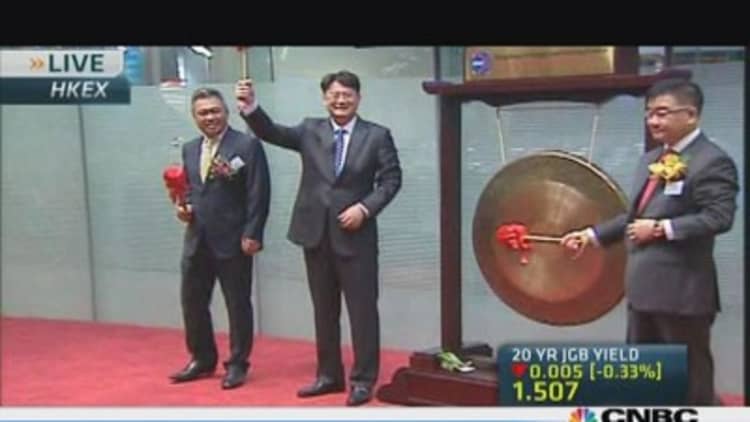A cemetery is one place most people would not choose to queue for. Except in Hong Kong, where the resurgent market for new equity listings is prompting some unusual behavior.
The $200 million deal from Fu Shou Yuan, a mainland-based chain of burial grounds, is attracting fevered early interest from investors keen to tap the spending power of wealthy Chinese, even in the afterlife.
In spite of missing out – at least for now – on the blockbuster listing of Alibaba, Hong Kong's market for initial public offerings has sprung back to life. After a nervous few months, deal flow has picked up, guaranteeing that 2013 will better last year's moribund haul. In the year to date, $12 billion has been raised in the city, beating last year's total of $11.4 billion, according to Dealogic.
(Read more: Hong Kong on track to regain IPO sizzle)
The deals are stacking up fast. In November alone, 13 companies filed their listing documents to the Hong Kong exchange, together hoping to raise more than $6 billion.

Bankers in Hong Kong have politicians in Beijing to thank. China's leadership announced a sweeping package of economic, financial and social reforms last month, which has boosted global sentiment towards Chinese investments. Equity analysts say they have received calls from eager fund managers as far away as Brazil and Spain, many of whom have previously never been interested, let alone invested, in Chinese stocks.
"Most of the global institutional investors have been structurally underweight in China for almost two years now. People started to reverse that underweight at the start of the summer. The plenum has added rocket fuel to that," says Rupert Mitchell, head of equity capital markets in Asia for Citi.
Daily trading volume on Hong Kong's H share index of Chinese stocks has risen more than 10 percent since the reforms were announced, and more than 30 percent since July. The index itself is up by a similar margin.
Damien Brosnan, head of Asia equity syndicate at UBS, says activity has been picking up since the summer, but that the market reaction to the plenum has boosted investor interest in IPOs, helping to get deals priced well and trading well.
More from the Financial Times:
Cinda poised to raise up to $2.5 billion in IPO
Xi's plan gives reason for optimism
Huishang Bank rises on Hong Kong debut
The best debuts have come from companies in the more popular consumer-related industries. Milk producer Huishan Dairy has seen its shares rise about 15 percent in the month following its $1.3 billion debut, thanks partly to a region-wide rush into the sector.
Phoenix Healthcare, the first Chinese private hospital operator to list in Hong Kong, attracted about $5 billion of orders for just $200 million of stock, while bad bank Cinda has received a flood of early orders for its $2.8 billion deal, which will price on Thursday.
The November rally has also brought Sinopec Engineering and Galaxy Securities, which both listed in May, back well above their IPO prices after months underwater.
Bankers have taken heart from the return of an important investor base that had largely been absent from deals earlier in the year: hedge funds. The Cinda IPO has attracted a trio of global funds – Och-Ziff, Farallon Capital Management, and Oaktree – something many hope will become a trend.
(Read more: After Smithfield deal, is a massive Asian IPO in pipeline?)
"The fact that hedge funds are taking up cornerstone positions is a pretty good sign of their views on the equity market," says Nathan McMurtray, head of Asia equity-linked origination at Deutsche Bank. "It bodes quite well for equity and equity-linked deals."
Not all the recent listings have done well. Huirong Financial, a small mainland bank, has fallen by almost a quarter since it began trading in October. Bank of Chongqing and Huishang Bank – two regional Chinese lenders – are both still below their listing prices after raising $550 million and $1.3 billion respectively.
Some have voiced concern that IPO fatigue could set in should too many deals be pushed through in quick succession, while the reopening of China's market will give mainland companies a viable alternative listing venue.
(Read more: Hong Kong IPO market heats up with $3.5 billion Sinopec unit)
However, bankers say the current momentum augers well for a number of large deals expected in the first half of next year, such as Watsons, owner of UK pharmacy chain Superdrug, and the spin-off of Hong Kong Electric. Pork producer Shuanghui, which recently completed its $7.5 billion takeover of U.S. company Smithfield, has also hired banks for a potential $5 billion listing.
All this fuels growing optimism that the Hong Kong market's return to form may last. "The market is well bid right now," says Mr Mitchell. "I think things are gearing up for a pretty busy 2014."

